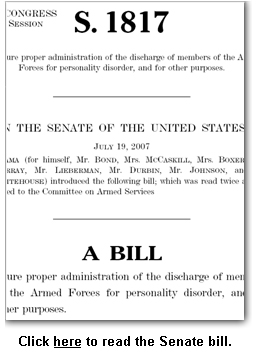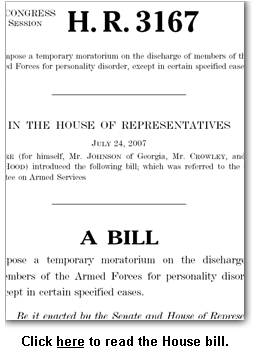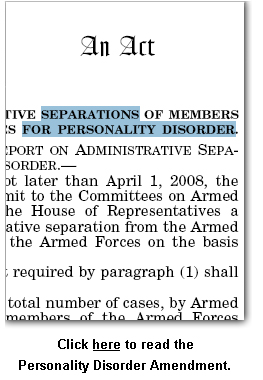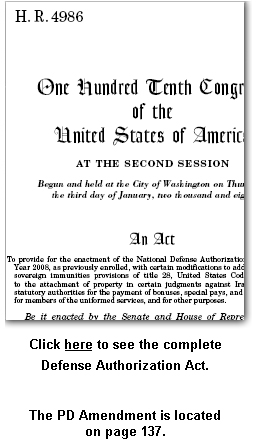| |
| 
|

|
|
In July 2007 Barack Obama, then a senator, put forward a bill to halt on all personality disorder discharges. Five days later Congressman Phil Hare introduced a matching bill in the House.
Both bills were referred to the Armed Services Committee. But neither had enough support to pass. As Rep. Bob Filner explains, few in Washington were aware of the personality disorder scandal. And no one in Congress had been receiving phone calls from constituents demanding that they support the bill.
 
Proponents of the personality disorder bill hoped that Obama, in his run for the presidency, would draw attention to the fraudulent discharges and his efforts to stop them. That didn't happen. In the 21 months of his presidential run, the Illinois senator never spoke publicly about PD discharges or his bill to halt them.
Eventually, without widespread public knowledge or support, and facing opposition from senators who had never heard of personality disorder and worried that the bill would open a floodgate of expensive benefits, Obama and Senator Kit Bond, the bill's co-author, were forced to reshape it into an amendment and water down its contents.
Their PD amendment did not halt PD discharges. Instead, it required the Pentagon to investigate PD dismissals and report back to Congress. The amendment, part of the 2008 Defense Authorization Act, was signed by President Bush in January 2008.
|
|
|
 
|
|
| |
|
The Pentagon completed its investigation of PD discharges in June 2008. The report, written by former Under Secretary of Defense for Personnel and Readiness David Chu, concluded that no soldiers had been improperly diagnosed, and none had been wrongly discharged.
Chu's report did recommend several changes to the PD discharge system, alterations, it says, that will protect soldiers from being wrongly discharged. Those protections include requiring that a doctor diagnose the soldier's personality disorder and a lawyer counsel him on the ramifications of the discharge. The report also recommends that the surgeon general review each soldier's case and endorse the PD discharge before releasing the soldier from the military.
|
|
| |
|
|
|
| |
|
Chu, a Bush appointee, left office in 2008 with the former president. But his findings remain the Defense Department's official position. The Pentagon says Clifford Stanley, the current under secretary, is implementing Chu's recommendations and fully embraces his findings.

|
|
| |
|
| |
|